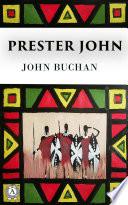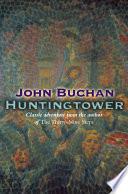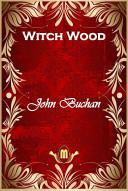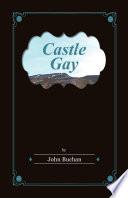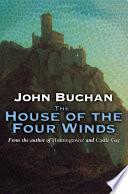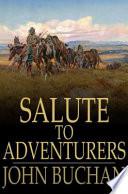“Happiness lies only in a divine unrest; and if you are lapped in comfort you stagnate and miss it.”
Source: A Lodge in the Wilderness (1906), Ch. I, p. 23
John Buchan, 1st Baron Tweedsmuir was a Scottish novelist, historian and Unionist politician who served as Governor General of Canada, the 15th since Canadian Confederation.
After a brief legal career, Buchan simultaneously began his writing career and his political and diplomatic careers, serving as a private secretary to the colonial administrator of various colonies in southern Africa. He eventually wrote propaganda for the British war effort in the First World War. Buchan was in 1927 elected Member of Parliament for the Combined Scottish Universities, but he spent most of his time on his writing career, notably writing The Thirty-Nine Steps and other adventure fiction. In 1935 he was appointed Governor General of Canada by King George V, on the recommendation of Prime Minister of Canada R. B. Bennett, to replace the Earl of Bessborough. He occupied the post until his death in 1940. Buchan proved to be enthusiastic about literacy, as well as the evolution of Canadian culture, and he received a state funeral in Canada before his ashes were returned to the United Kingdom.
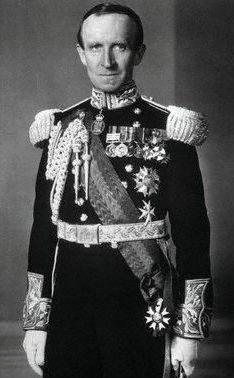
“Happiness lies only in a divine unrest; and if you are lapped in comfort you stagnate and miss it.”
Source: A Lodge in the Wilderness (1906), Ch. I, p. 23
“The Simple Life is the last refuge of complicated and restless souls.”
Source: A Lodge in the Wilderness (1906), Ch. I, p. 22
“The secret of life is to find out what one really wants.”
Source: A Lodge in the Wilderness (1906), Ch. II, p. 43
“I have heard an atheist defined as a man who had no invisible means of support.”
A play on words commonly used referring to vagrants or paupers as having "no visible means of support" financially, speaking to the Law Society of Upper Canada, (21 February 1936); published in Canadian Occasions (1940), p. 201. Buchan's source for this definition remains unknown. The witticism was repeated by Harry Emerson Fosdick in his On Being a Real Person (1943), ch. 1, with due acknowledgement to Buchan, and was again used by Archbishop Fulton J. Sheen in Look magazine (December 14, 1955). The credit for this line is therefore often wrongly given to Fosdick or to Sheen. Credit has also been given to the conductor Walter Damrosch (1862-1950).
Canadian Occasions (1940)
Pilgrim's Way (1940), p. 241
Memory Hold-The-Door (1940)
Source: A Lodge in the Wilderness (1906), Ch. XII, pp. 336–7
Space (1912)
Source: The House of the Four Winds (1935), Ch. IV
Source: A Lodge in the Wilderness (1906), Ch. III, p. 69
Source: Midwinter (1923), Ch. XVIII
Source: The Power-House (1916), Ch. 4 "I Follow The Trail Of The Super-Butler"
Pilgrim’s Way (1940)
Memory Hold-The-Door (1940)
Augustus (1937)
Prologue
The House of the Four Winds (1935)
“Civilisation needs more than the law to hold it together.”
Source: The Power-House (1916), Ch. 3 "Tells of a Midsummer Night"
Context: Civilisation needs more than the law to hold it together. You see, all mankind are not equally willing to accept as divine justice what is called human law.
Source: The Power-House (1916), Ch. 3 "Tells of a Midsummer Night"
Context: Civilisation knows how to use such powers as it has, while the immense potentiality of the unlicensed is dissipated in vapour. Civilisation wins because it is a world-wide league; its enemies fail because they are parochial. But supposing … supposing anarchy learned from civilisation and became international. Oh, I don't mean the bands of advertising donkeys who call themselves International Unions of Workers and suchlike rubbish. I mean if the real brain-stuff of the world were internationalised. Suppose that the links in the cordon of civilisation were neutralised by other links in a far more potent chain. The earth is seething with incoherent power and unorganised intelligence.
“By a principle I mean something that is an eternal and universal truth.”
"A University's Bequest to Youth" (10 October 1936)
Canadian Occasions (1940)
Context: To-day we have fewer dogmas, but I think that we have stronger principles. By a dogma I mean a deduction from facts which is only valid under certain conditions, and which becomes untrue if those conditions change. By a principle I mean something that is an eternal and universal truth.
“This crowded world of Space was perfectly real to him. How he had got to it I do not know.”
Space (1912)
Context: This crowded world of Space was perfectly real to him. How he had got to it I do not know. Perhaps his mind, dwelling constantly on the problem, had unsealed some atrophied cell and restored the old instinct. Anyhow, he was living his daily life with a foot in each world.
Source: The Power-House (1916), Ch. 3 "Tells of a Midsummer Night"
Context: Civilisation knows how to use such powers as it has, while the immense potentiality of the unlicensed is dissipated in vapour. Civilisation wins because it is a world-wide league; its enemies fail because they are parochial. But supposing … supposing anarchy learned from civilisation and became international. Oh, I don't mean the bands of advertising donkeys who call themselves International Unions of Workers and suchlike rubbish. I mean if the real brain-stuff of the world were internationalised. Suppose that the links in the cordon of civilisation were neutralised by other links in a far more potent chain. The earth is seething with incoherent power and unorganised intelligence.
Prologue
The Path of the King (1921)
Context: Generations follow, oblivious of the high beginnings, but there is that in the stock which is fated to endure. The sons and daughters blunder and sin and perish, but the race goes on, for there is a fierce stuff of life in it. It sinks and rises again and blossoms at haphazard into virtue or vice, since the ordinary moral laws do not concern its mission. Some rags of greatness always cling to it, the dumb faith that sometime and somehow that blood drawn from kings it never knew will be royal again. Though nature is wasteful of material things, there is no waste of spirit. And then after long years there comes, unheralded and unlooked-for, the day of the Appointed Time...
Source: The Power-House (1916), Ch. 3 "Tells of a Midsummer Night"
Context: I read now and then in the papers that some eminent scientist had made a great discovery. He reads a paper before some Academy of Science, and there are leading articles on it, and his photograph adorns the magazines. That kind of man is not the danger. He is a bit of the machine, a party to the compact. It is the men who stand outside it that are to be reckoned with, the artists in discovery who will never use their knowledge till they can use it with full effect.
Source: The Power-House (1916), Ch. 3 "Tells of a Midsummer Night"
Context: I cannot pry into motives. I only know of the existence of great extra-social intelligences. Let us say that they distrust the machine. They may be idealists and desire to make a new world, or they may simply be artists, loving for its own sake the pursuit of truth. If I were to hazard a guess, I should say that it took both types to bring about results, for the second find the knowledge and the first the will to use it.
Space (1912)
Context: Remember his mind and no other part of him lived in his new world. He said it gave him an odd sense of detachment to sit in a room among people, and to know that nothing there but himself had any relation at all to the infinite strange world of Space that flowed around them. He would listen, he said, to a great man talking, with one eye on the cat on the rug, thinking to himself how much more the cat knew than the man.
Source: The Power-House (1916), Ch. 8 "The Power-House"
Context: I am a sceptic about most things... but, believe me, I have my own worship. I venerate the intellect of man. I believe in its undreamed-of possibilities, when it grows free like an oak in the forest and is not dwarfed in a flower-pot. From that allegiance I have never wavered. That is the God I have never forsworn.
“The true achievement of Augustus is that he saved the world from disintegration.”
Augustus (1937)
Context: The true achievement of Augustus is that he saved the world from disintegration. Without him Rome must have lost her conquests one by one, and seen them relapse into barbarism or degenerate into petty satrapies. The wild peoples of the East and North would have ante-dated their invasions by centuries.
Space (1912)
Context: I gathered from Hollond that he was always conscious of corridors and halls and alleys in Space, shifting, but shifting according to inexorable laws. I never could get quite clear as to what this consciousness was like. When I asked he used to look puzzled and worried and helpless.
Space (1912)
Context: How if Space is really full of things we cannot see and as yet do not know? How if all animals and some savages have a cell in their brain or a nerve which responds to the invisible world? How if all Space be full of these landmarks, not material in our sense, but quite real? A dog barks at nothing, a wild beast makes an aimless circuit. Why? Perhaps because Space is made up of corridors and alleys, ways to travel and things to shun? For all we know, to a greater intelligence than ours the top of Mont Blanc may be as crowded as Piccadilly Circus.
Prologue
The Path of the King (1921)
Context: The spark once transmitted may smoulder for generations under ashes, but the appointed time will come, and it will flare up to warm the world. God never allows waste. And we fools rub our eyes and wonder, when we see genius come out of the gutter. It didn't begin there. We tell ourselves that Shakespeare was the son of a woolpedlar, and Napoleon of a farmer, and Luther of a peasant, and we hold up our hands at the marvel. But who knows what kings and prophets they had in their ancestry!
“We think our castles of sand are the ramparts of the universe.”
Source: The Power-House (1916), Ch. 3 "Tells of a Midsummer Night"
Context: When all is said, we are ruled by the amateurs and the second-rate. The methods of our departments would bring any private firm to bankruptcy. The methods of Parliament — pardon me — would disgrace any board of directors. Our rulers pretend to buy expert knowledge, but they never pay the price for it that a business man would pay, and if they get it they have not the courage to use it. Where is the inducement for a man of genius to sell his brains to our insipid governors?
And yet knowledge is the only power — now as ever. A little mechanical device will wreck your navies. A new chemical combination will upset every rule of war. It is the same with our commerce. One or two minute changes might sink Britain to the level of Ecuador, or give China the key of the world's wealth. And yet we never dream that these things are possible. We think our castles of sand are the ramparts of the universe.
“When all is said, we are ruled by the amateurs and the second-rate.”
Source: The Power-House (1916), Ch. 3 "Tells of a Midsummer Night"
Context: When all is said, we are ruled by the amateurs and the second-rate. The methods of our departments would bring any private firm to bankruptcy. The methods of Parliament — pardon me — would disgrace any board of directors. Our rulers pretend to buy expert knowledge, but they never pay the price for it that a business man would pay, and if they get it they have not the courage to use it. Where is the inducement for a man of genius to sell his brains to our insipid governors?
And yet knowledge is the only power — now as ever. A little mechanical device will wreck your navies. A new chemical combination will upset every rule of war. It is the same with our commerce. One or two minute changes might sink Britain to the level of Ecuador, or give China the key of the world's wealth. And yet we never dream that these things are possible. We think our castles of sand are the ramparts of the universe.
Augustus (1937)
Context: History does not repeat itself except with variations, and it is idle to look for exact parallels, but we can trace a resemblance between the conditions of his time and those of to-day. Once again the crust of civilization has worn thin, and beneath can be heard the muttering of primeval fires. Once again many accepted principles of government have been overthrown, and the world has become a laboratory where immature and feverish minds experiment with unknown forces. Once again problems cannot be comfortably limited, for science has brought the nations into an uneasy bondage to each other. In the actual business of administration there is no question of today which Augustus had not to face and answer.
“To-day we have fewer dogmas, but I think that we have stronger principles.”
"A University's Bequest to Youth" (10 October 1936)
Canadian Occasions (1940)
Context: To-day we have fewer dogmas, but I think that we have stronger principles. By a dogma I mean a deduction from facts which is only valid under certain conditions, and which becomes untrue if those conditions change. By a principle I mean something that is an eternal and universal truth.
Preface
The Power-House (1916)
Context: I once played the chief part in a rather exciting business without ever once budging from London. And the joke of it was that the man who went out to look for adventure only saw a bit of the game, and I who sat in my chambers saw it all and pulled the strings. 'They also serve who only stand and wait,' you know.
Space (1912)
Context: Leithen's story had bored and puzzled me at the start, but now it had somehow gripped my fancy. Space a domain of endless corridors and Presences moving in them! The world was not quite the same as an hour ago. It was the hour, as the French say, "between dog and wolf," when the mind is disposed to marvels.
Space (1912)
Context: How if Space is really full of things we cannot see and as yet do not know? How if all animals and some savages have a cell in their brain or a nerve which responds to the invisible world? How if all Space be full of these landmarks, not material in our sense, but quite real? A dog barks at nothing, a wild beast makes an aimless circuit. Why? Perhaps because Space is made up of corridors and alleys, ways to travel and things to shun? For all we know, to a greater intelligence than ours the top of Mont Blanc may be as crowded as Piccadilly Circus.
Source: The Power-House (1916), Ch. 3 "Tells of a Midsummer Night"
Context: "It would scarcely be destruction," he replied gently. "Let us call it iconoclasm, the swallowing of formulas, which has always had its full retinue of idealists. And you do not want a Napoleon. All that is needed is direction, which could be given by men of far lower gifts than a Bonaparte. In a word, you want a Power-House, and then the age of miracles will begin."
Prologue
The Path of the King (1921)
Context: Generations follow, oblivious of the high beginnings, but there is that in the stock which is fated to endure. The sons and daughters blunder and sin and perish, but the race goes on, for there is a fierce stuff of life in it. It sinks and rises again and blossoms at haphazard into virtue or vice, since the ordinary moral laws do not concern its mission. Some rags of greatness always cling to it, the dumb faith that sometime and somehow that blood drawn from kings it never knew will be royal again. Though nature is wasteful of material things, there is no waste of spirit. And then after long years there comes, unheralded and unlooked-for, the day of the Appointed Time...
Space (1912)
Context: Supposing you knew — not by sight or by instinct, but by sheer intellectual knowledge, as I know the truth of a mathematical proposition — that what we call empty space was full, crammed. Not with lumps of what we call matter like hills and houses, but with things as real — as real to the mind.
Augustus (1937)
Context: There is no merit in an empire as such. Extension in space does not necessarily mean spiritual advancement. The small community is easier to govern, and, it may well be, more pleasant to live in. If its opportunities are limited its perils are also circumscribed. But the alternatives which confronted him were empire or anarchy.
Augustus (1937)
Context: If his "magna imago" could return to earth, he would be puzzled at some of our experiments in empire, and might well complain that the imperfections of his work were taken as its virtues, and that so many truths had gone silently out of mind. He had prided himself on having given the world peace, and he would be amazed by the loud praise of war as a natural and wholesome concomitant of a nation's life. Wars he had fought from an anxious desire to safeguard his people, as the shepherd builds the defences of his sheepfold; but he hated the thing, because he knew well the deadly "disordering," which the Greek historian noted as the consequence of the most triumphant campaign. He would marvel, too, at the current talk of racial purity, the exaltation of one breed of men as the chosen favourites of the gods. That would seem to him not only a defiance of the new Christian creed, but of the Stoicism which he had sincerely professed.
Augustus (1937)
Context: History does not repeat itself except with variations, and it is idle to look for exact parallels, but we can trace a resemblance between the conditions of his time and those of to-day. Once again the crust of civilization has worn thin, and beneath can be heard the muttering of primeval fires. Once again many accepted principles of government have been overthrown, and the world has become a laboratory where immature and feverish minds experiment with unknown forces. Once again problems cannot be comfortably limited, for science has brought the nations into an uneasy bondage to each other. In the actual business of administration there is no question of today which Augustus had not to face and answer.
“He disliked emotion, not because he felt lightly, but because he felt deeply.”
Pilgrim's Way (1940), p. 58
Memory Hold-The-Door (1940)
“What can stand against loyalty? It is the faith that moves mountains.”
Source: Midwinter (1923), Ch. X
Source: The Path of the King (1921), Ch. VIII "The Hidden City"
Source: Huntingtower (1922), Ch. 2
Source: The Power-House (1916), Ch. 3 "Tells of a Midsummer Night"
Augustus (1937)
Memory Hold-The-Door (1940)
“The robe of flesh wears thin, and with the years God shines through all things.”
"The Wise Years", The Moon Endureth (1912)
Source: The Power-House (1916), Ch. 1 "Beginning of the Wild-Goose Chase"
Source: Huntingtower (1922), Ch. 9
“Boldness, and still boldness, was the only wisdom. To be cautious was to be rash.”
Source: Midwinter (1923), Ch. X
Source: Salute to Adventurers (1915), Ch. 3 "The Canongate Tollbooth"
But I could see a hint of fear in his eyes.
Space (1912)
“Truth's like a dollar-piece, it's got two sides, and both are wanted to make it good currency.”
Source: The Path of the King (1921), Ch. XIV "The End of the Road", I
Source: The Power-House (1916), Ch. 1 "Beginning of the Wild-Goose Chase"
“The best prayers have often more groans than words.”
This has also been attributed to Buchan, but is again from John Bunyan, Discourse on Prayer.
Misattributed
Space (1912)
Source: The Power-House (1916), Ch. 1 "Beginning of the Wild-Goose Chase"
Source: Huntingtower (1922), Ch. 6
“We can pay our debts to the past by putting the future in debt to ourselves.”
Address to the people of Canada on the coronation of George VI (12 May 1937)
This has similarly been attributed to Buchan, but is actually a misrendering of a sentence from the first paragraph of John Bunyan, Discourse on Prayer. Bunyan's original sentence reads: "It is the opener of the heart of God, and a means by which the soul, though empty, is filled."
Misattributed
Source: Midwinter (1923), Ch. I
“[On the newspapers of the Craw Press:] Their politics are an opiate to prevent folk thinking.”
Source: Castle Gay (1930), Ch. 3
"A University's Bequest to Youth" (10 October 1936)
Canadian Occasions (1940)
